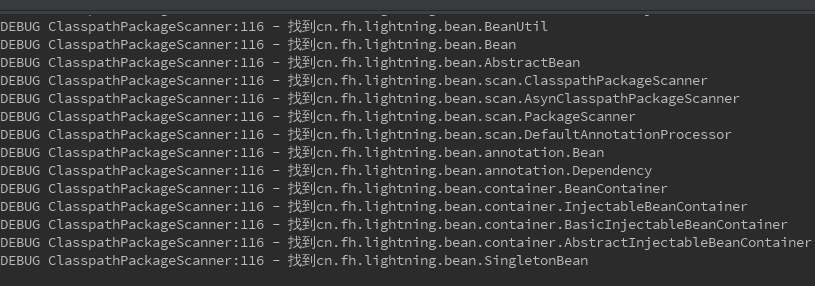在写一个MVC框架,需要从包中扫描出组件并注册到容器中,而JDK没有提供现成的从方法,只能自己实现。
功能:
给定一个包名,编程得到该包(和其所有子包)下所有的类文件。如,输入包名com.myapp.util, 输出该包下类的全限定名com.myapp.util.StringUtils, com.app.util.ImageUtils等。
思路:
有的web server在部署运行时会解压jar包,因此class文件会在普通的文件目录下。如果web server不解压jar包,则class文件会直接存在于Jar包中。对于前者,只需定位到class文件所在目录,然后将class文件名读取出即可;对于后者,则需先定位到jar包所在目录,然后使用JarInputStream读取Jar包,得到class类名。
实现:
这是从写好的项目代码中直接copy出来的,如果要运行这段代码,需要把所有的Logger.debug改成System.out.println()
/**
* This scanner is used to find out all classes in a package.
* Created by whf on 15-2-26.
*/
public class ClasspathPackageScanner implements PackageScanner {
private Logger logger = LoggerFactory.getLogger(ClasspathPackageScanner.class);
private String basePackage;
private ClassLoader cl;
/**
* Construct an instance and specify the base package it should scan.
* @param basePackage The base package to scan.
*/
public ClasspathPackageScanner(String basePackage) {
this.basePackage = basePackage;
this.cl = getClass().getClassLoader();
}
/**
* Construct an instance with base package and class loader.
* @param basePackage The base package to scan.
* @param cl Use this class load to locate the package.
*/
public ClasspathPackageScanner(String basePackage, ClassLoader cl) {
this.basePackage = basePackage;
this.cl = cl;
}
/**
* Get all fully qualified names located in the specified package
* and its sub-package.
*
* @return A list of fully qualified names.
* @throws IOException
*/
@Override
public List<String> getFullyQualifiedClassNameList() throws IOException {
logger.info("开始扫描包{}下的所有类", basePackage);
return doScan(basePackage, new ArrayList<>());
}
/**
* Actually perform the scanning procedure.
*
* @param basePackage
* @param nameList A list to contain the result.
* @return A list of fully qualified names.
*
* @throws IOException
*/
private List<String> doScan(String basePackage, List<String> nameList) throws IOException {
// replace dots with splashes
String splashPath = StringUtil.dotToSplash(basePackage);
// get file path
URL url = cl.getResource(splashPath);
String filePath = StringUtil.getRootPath(url);
// Get classes in that package.
// If the web server unzips the jar file, then the classes will exist in the form of
// normal file in the directory.
// If the web server does not unzip the jar file, then classes will exist in jar file.
List<String> names = null; // contains the name of the class file. e.g., Apple.class will be stored as "Apple"
if (isJarFile(filePath)) {
// jar file
if (logger.isDebugEnabled()) {
logger.debug("{} 是一个JAR包", filePath);
}
names = readFromJarFile(filePath, splashPath);
} else {
// directory
if (logger.isDebugEnabled()) {
logger.debug("{} 是一个目录", filePath);
}
names = readFromDirectory(filePath);
}
for (String name : names) {
if (isClassFile(name)) {
//nameList.add(basePackage + "." + StringUtil.trimExtension(name));
nameList.add(toFullyQualifiedName(name, basePackage));
} else {
// this is a directory
// check this directory for more classes
// do recursive invocation
doScan(basePackage + "." + name, nameList);
}
}
if (logger.isDebugEnabled()) {
for (String n : nameList) {
logger.debug("找到{}", n);
}
}
return nameList;
}
/**
* Convert short class name to fully qualified name.
* e.g., String -> java.lang.String
*/
private String toFullyQualifiedName(String shortName, String basePackage) {
StringBuilder sb = new StringBuilder(basePackage);
sb.append('.');
sb.append(StringUtil.trimExtension(shortName));
return sb.toString();
}
private List<String> readFromJarFile(String jarPath, String splashedPackageName) throws IOException {
if (logger.isDebugEnabled()) {
logger.debug("从JAR包中读取类: {}", jarPath);
}
JarInputStream jarIn = new JarInputStream(new FileInputStream(jarPath));
JarEntry entry = jarIn.getNextJarEntry();
List<String> nameList = new ArrayList<>();
while (null != entry) {
String name = entry.getName();
if (name.startsWith(splashedPackageName) && isClassFile(name)) {
nameList.add(name);
}
entry = jarIn.getNextJarEntry();
}
return nameList;
}
private List<String> readFromDirectory(String path) {
File file = new File(path);
String[] names = file.list();
if (null == names) {
return null;
}
return Arrays.asList(names);
}
private boolean isClassFile(String name) {
return name.endsWith(".class");
}
private boolean isJarFile(String name) {
return name.endsWith(".jar");
}
/**
* For test purpose.
*/
public static void main(String[] args) throws Exception {
PackageScanner scan = new ClasspathPackageScanner("cn.fh.lightning.bean");
scan.getFullyQualifiedClassNameList();
}
}上面的代码中用到了StringUtils类,如下:
public class StringUtil {
private StringUtil() {
}
/**
* "file:/home/whf/cn/fh" -> "/home/whf/cn/fh"
* "jar:file:/home/whf/foo.jar!cn/fh" -> "/home/whf/foo.jar"
*/
public static String getRootPath(URL url) {
String fileUrl = url.getFile();
int pos = fileUrl.indexOf('!');
if (-1 == pos) {
return fileUrl;
}
return fileUrl.substring(5, pos);
}
/**
* "cn.fh.lightning" -> "cn/fh/lightning"
* @param name
* @return
*/
public static String dotToSplash(String name) {
return name.replaceAll("\\.", "/");
}
/**
* "Apple.class" -> "Apple"
*/
public static String trimExtension(String name) {
int pos = name.indexOf('.');
if (-1 != pos) {
return name.substring(0, pos);
}
return name;
}
/**
* /application/home -> /home
* @param uri
* @return
*/
public static String trimURI(String uri) {
String trimmed = uri.substring(1);
int splashIndex = trimmed.indexOf('/');
return trimmed.substring(splashIndex);
}
}执行结果:

























 1880
1880

 被折叠的 条评论
为什么被折叠?
被折叠的 条评论
为什么被折叠?








